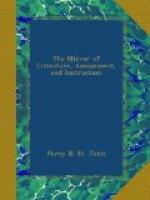“Dreary indeed is that hour of the twenty-four which may be said to afford the true division between night and day; when even the latest watcher has retired to rest, while the earliest artisans scarcely yet rouse themselves for the renewal of their struggle with existence;—when even the studious, the sorrowing, and the dissipated, close their over-wearied eyes;—and when those who ’do lack, and suffer hunger,’ enjoy that Heaven-vouchsafed stupor affording the only interim to their consciousness of want and woe. The winds whistle more shrilly in the stillness of that lonely hour. Man and beast are in their lair, and unearthly things alone seem stirring;—the good genius glides with a holy and hallowing influence through the tranquil dwelling of virtue; the demon grins and gibbers in the deserted but reeking chambers of the vicious. Even sorrow has phantoms of its own; and when Amelia found herself a lonely watcher in the stillness of night, the kind voice of old Allanby,—the voice that was wont of yore to bid her speak her bosom’s wish that it might be granted,—often seemed creeping into the inmost cell of her ear. She could fancy him close beside her,—taunting her,—touching her,—till, starting from her seat, she strove to shake off the hideous delusion. Sometimes the soft cordial tones of her mother,—her mother, who was in the grave,—seemed again dispensing those lessons of virtue of which her own life had afforded so pure an example: sometimes the playful caresses of her boys seemed to grow warm upon her lips—around her neck. Yes! she could hear them, see them:—little Charles, who, in his very babyhood, had been accustomed to uplift his tiny arm in championship of his own dear mother;—Digby, the soft, tender, loving infant, whose every look was a smile, whose every action an endearment!—And now they appeared to pass before her as strangers; changed—matured—enlightened;—without one word of fondness—one gesture of recognition!




